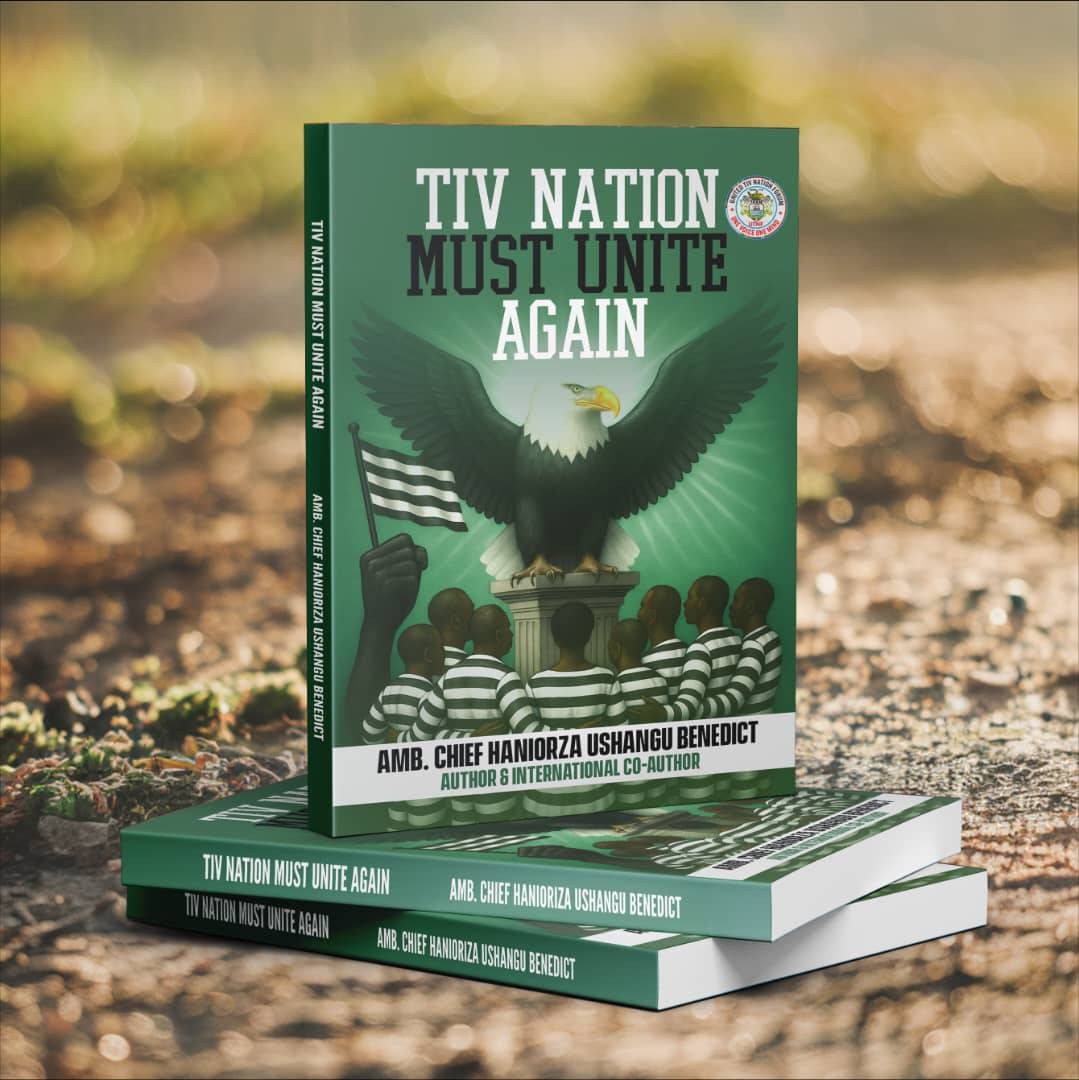Un Llamado Urgente a la Unidad: "Tiv Nation Must Unite Again"
ART ESP / ING
En medio de la desolación y el clamor por la paz, emerge una voz que resuena con la esperanza y la determinación necesarias para la supervivencia de la Nación Tiv. Es en este contexto de crisis que obras como "Tiv Nation Must Unite Again", del Embajador Jefe Haniorza Ushangu Benedict, adquieren una relevancia fundamental. La portada del libro, con su potente imagen de un águila majestuosa, símbolo de fuerza y libertad, elevándose sobre un grupo de individuos, algunos de ellos con lo que parecen ser vestimentas carcelarias o uniformes de detención, encapsula el espíritu de la lucha y el anhelo de liberación de un pueblo oprimido. El título mismo no es solo un llamado, sino una declaración de la imperiosa necesidad de cohesión en tiempos de adversidad.
El mensaje central de "Tiv Nation Must Unite Again" se alinea directamente con los pilares que hemos identificado como esenciales para la construcción de una paz duradera. Ante la fragmentación social y la erosión de la confianza que los ataques de bandidos fulani han provocado, la unidad se presenta no solo como una aspiración, sino como una estrategia vital. El Embajador Jefe Benedict, como autor y co-autor internacional, probablemente aborda en sus páginas las complejas dinámicas que han llevado a la actual crisis, pero con un enfoque proactivo hacia la resolución.
El libro, al llevar el lema "Tiv Nation Must Unite Again", sugiere una profunda reflexión sobre las divisiones internas, la pérdida de identidad colectiva o la necesidad de superar diferencias en pro de un objetivo común: la seguridad y la prosperidad de su pueblo. En un escenario donde las comunidades son asoladas y la supervivencia está en juego, la capacidad de unirse, de dejar a un lado los desacuerdos menores en aras de la defensa mutua y la reconstrucción, se convierte en la única vía para la resiliencia.
Se puede inferir que esta obra no solo documenta el sufrimiento y los desafíos de la Nación Tiv, sino que también ofrece un marco, o al menos una invitación, para la acción colectiva. Es probable que el Embajador Jefe Benedict, a través de su experiencia y conocimiento, proponga estrategias para fortalecer el liderazgo local, fomentar la reconciliación entre las facciones y movilizar a la población hacia la autodefensa pacífica y la reconstrucción comunitaria. La imagen del águila elevándose podría simbolizar el potencial de la Nación Tiv para superar sus actuales pruebas y volar hacia un futuro de libertad y autodeterminación, si logran consolidar sus fuerzas.
En definitiva, "Tiv Nation Must Unite Again" se posiciona como una herramienta crucial en el diálogo sobre la paz y la supervivencia en la Nación Tiv. No es solo un libro, sino un manifiesto que busca inspirar a un pueblo a encontrar la fuerza en su propia cohesión, recordándoles que solo a través de la unidad podrán enfrentar y superar los desafíos que amenazan con desmantelar su existencia. Su mensaje, resonando con la urgencia del momento, es un testimonio de la inquebrantable esperanza de un pueblo que se niega a ser doblegado.
------------------
Amidst the desolation and the cry for peace, a voice emerges, resonating with the hope and determination necessary for the survival of the Tiv Nation. It is within this crisis context that works like "Tiv Nation Must Unite Again," by Ambassador Chief Haniorza Ushangu Benedict, acquire fundamental relevance. The book's cover, with its powerful image of a majestic eagle—a symbol of strength and freedom—soaring above a group of individuals, some of whom appear to be in prison attire or detention uniforms, encapsulates the spirit of the struggle and the yearning for liberation of an oppressed people. The title itself is not just a call, but a declaration of the imperative need for cohesion in times of adversity.
The central message of "Tiv Nation Must Unite Again" directly aligns with the pillars we have identified as essential for building lasting peace. In the face of social fragmentation and the erosion of trust caused by the Fulani bandit attacks, unity is presented not just as an aspiration, but as a vital strategy. Ambassador Chief Benedict, as an author and international co-author, likely addresses in his pages the complex dynamics that have led to the current crisis, but with a proactive approach towards resolution.
By bearing the slogan "Tiv Nation Must Unite Again," this work suggests a deep reflection on internal divisions, the loss of collective identity, or the need to overcome differences for the sake of a common goal: the security and prosperity of its people. In a scenario where communities are ravaged and survival is at stake, the ability to unite, to set aside minor disagreements for mutual defense and reconstruction, becomes the only path to resilience.
It can be inferred that this work not only documents the suffering and challenges of the Tiv Nation but also offers a framework, or at least an invitation, for collective action. Ambassador Chief Benedict, through his experience and knowledge, likely proposes strategies to strengthen local leadership, foster reconciliation among factions, and mobilize the population towards peaceful self-defense and community rebuilding. The image of the soaring eagle could symbolize the Tiv Nation's potential to overcome its current trials and fly towards a future of freedom and self-determination, if they manage to consolidate their strength.
Ultimately, "Tiv Nation Must Unite Again" positions itself as a crucial tool in the dialogue about peace and survival in the Tiv Nation. It is not just a book, but a manifesto that seeks to inspire a people to find strength in their own cohesion, reminding them that only through unity can they confront and overcome the challenges threatening to dismantle their existence. Its message, resonating with the urgency of the moment, is a testament to the unbreakable hope of a people who refuse to be broken.

